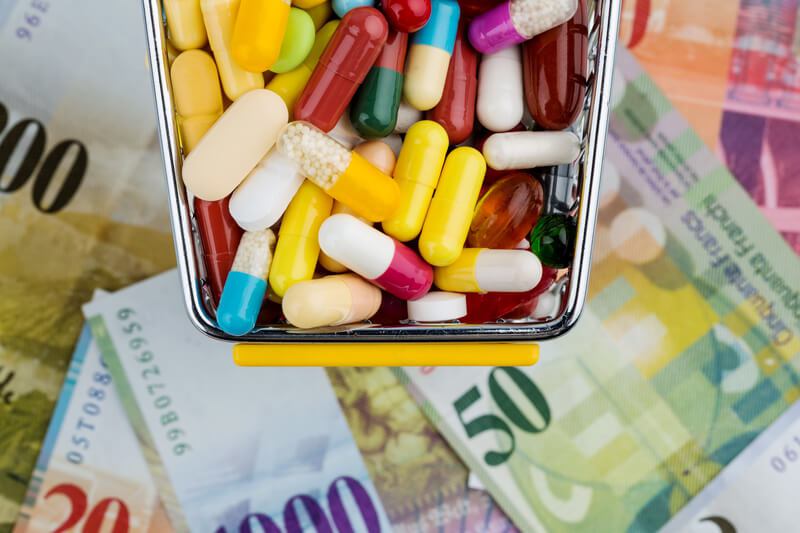24 Heures.
In Switzerland, a 16-pack of 500mg Dafalgan Odis (Paracetamol) costs CHF 8.60. A comparable French product, Doliprane, costs 1.12 euros for a box of 12 tablets the same size. 12 tablets of 500 mg of Algifor (Ibuprofen) costs CHF 9.90 compared to 2.50 euros for a similar box of Advil in France.
Another product, Nivea Baby Serum physiologique (24 x 5 ml), an eye and nose cleanser for babies, costs CHF 9.50 ordered from the Swiss online retailer Zur Rose. In France, at LaSante.net it costs 1.69 euros for a larger pack of 30 x 5ml doses. And the insect repellant Anti-Brumm strong, is twice the price of a similar product in France. These are a few examples.
What is going on?
Algifor and Anti-Brumm strong, are brands belonging to Basel-based Galenica, a company which has nearly doubled its sales in a decade. In addition to drugs, the company owns drug retailers such as Amavita and Sunstore as well as a share in Coop Vitality. So Galenica Group makes drugs, wholesales them, and sells them via its own pharmacies.
Switzerland’s price watchdog, known as Mr. Price, regularly takes a swipe at medicine prices. In August he pointed out that Swiss often pay four times as much as residents of neighbouring countries. Others such as Santé Suisse and the Swiss Consumer Federation (SCF) have voiced the same complaint. “These differences are even more galling for those insured, who must buy in Switzerland in order to be reimbursed” said Joy Demeulemeester, the person responsable for health at SCF. Only Interpharma, a lobby group for drug makers, thinks the differences are trivial.
Santé Suisse calculated that if the margins of wholesalers, pharmacies and doctors were brought into line with neighbouring countries, CHF 458 could be saved every year. “We must control margins more strictly, particularly in Switzerland where drug makers have the power to impose high prices” said Andreas Schiesser, head of the Medicines project at Santé Suisse.
The law stipulates a wholesale margin between 4 and 6% for a product over CHF 100. “From that the wholesaler must pay for storage, financing, distribution and salaries” said a spokesperson from Galenica. At a price of CHF 2,570 the margin is capped at CHF 240. In addition, the Swiss market is limited, regulated and multilingual, adding to costs.
An easy way to reduce wholesale margins would be to increase the price offered to the wholesaler. Overall this would cost nothing if the manufacturer and wholesaler were part of the same group.
According to Andreas Schiesser, the lobbying power of the industry in Bern does a better job of explaining the high prices in Switzerland. The size of pharmaceutical companies puts them in a position of strength. Only drug makers are able to challenge the Swiss Federal Office of Health’s decisions in court. Generic alternatives to branded drugs are often hard to find in Switzerland. This exacerbates the price problem. Santé Suisse reckons between CHF 300 and 800 million a year could be saved if the reimbursements for drugs were capped at the price of the best value generic equivalents.
Products like Anti-Brumm and Nivea Baby Serum physiologique are not regulated. Free market forces don’t seem to work here either.
More on this:
24 Heures article (in French) – Take a 5 minute French test now
Galenica annual report 2016 – opens PDF (in English)
Tags: newslettersent




































